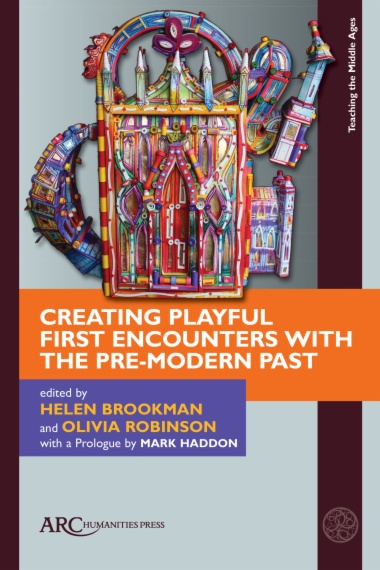This collection explores playful ways of fostering creative engagements with the medieval and early modern past and its own literary and artistic products, especially among those new to their study.
As scholars and teachers of early English, the contributors cover literary and cultural material from a range of genres within the Old English, Middle English, Tudor, and Stuart periods and collectively delve into a shared interest in facilitating what we might loosely define as “newcomer” or “non-specialist” encounters with the past: initial, exploratory contact in which prior knowledge cannot be assumed, whether involving creative professionals, experts from other disciplines, undergraduate and school students, or members of the public. Considering artworks and installation, theatre and performance and curation practices, case studies offer practice-based examples of learning and engagement which proceed primarily through creative and playful approaches. The case studies are arranged into two broad groups: those which work through performance and theatrical play of various kinds, and those which work through playful practices of production and making. All share a perspective of irreverence, of vivid immersion, and of the possibilities of conjuring with the past.
- Front Cover
- Front matter
- Half-title
- Series information
- Title page
- Copyright information
- Table of contents
- List of figures
- Acknowledgments
- Body
- Prologue: “Juniper and Mare’s Cheese”
- Introduction
- Part One: Play through Performance
- Chapter 1. Gamifying the Canterbury Tales 1:
Adopt-a-Pilgrim, Harry Bailley’s Game,
and an RPG Canterbury Tales
- Play and Role-playing, Creativity and Gamification
- Adopt-a-Pilgrim, Level 1: A Traditional Assignment
- ENGL A610: Gamifying Chaucer’s Canterbury Tales, Spring 2016
- Course Plan: What I Prepared for the Students
- How We Spent a Typical Class
- Initial Conditions: What I Had the Students Do to Develop
Their RPG Pilgrims
- Expanding the Course: An RPG Canterbury Tales
- Conclusion: The Pedagogy of the Replay
- Bibliography
- Chapter 2. Swiss Shakespeare: Creative Translation as Research and Appropriation
- Love’s Labour’s Lost
- The Merchant of Venice
- The Benefits of Swiss Shakespeare
- Bibliography
- Chapter 3. Creating Medieval Drama: Student Actors, Public Audiences, and Middle English Plays
- Creating Medieval Drama and Student Learning: English Students
- Creating Medieval Drama and Student Learning: Students from Other Disciplines
- Students and Faith
- Audience Q and A
- Bibliography
- Chapter 4. Playing Shakespeare in the
Elementary Classroom
- 1. “I get to express myself”
- 2. “I felt brave and it gave me confidence”
- 3. “I liked learning new words”
- 4. “I felt proud at the end”
- 5. “It was fun to do this with my friends”
- 6. “I felt a connection”
- Bibliography
- Part Two: Play through Production
- Chapter 5. “Arthurian Transformations”:
Undergraduate Students Curating
a Digital Exhibition in an Interdisciplinary Medievalism Module
- Opportunity and Transformation
- Interdisciplinarity and Mixed-Discipline Groups
- Collaboration and Co-creativity
- Conclusion
- Bibliography
- Chapter 6. “Create the Rest”: Learning through
Doing in Shakespearean Education
- Chapter 7. Formation from “Fragments”: Learning about Twelfth-Century Liturgy through Creative Engagement with Evidence
- Finding “Fragments”
- Blue, Black, and Red
- Participating in the Life of “the Fragment”
- “But is the Fragment Scottish?”
- “Play”: The Antithesis of Philology
- Learning from “the Fragment”
- Owning “the Fragment”
- Bibliography
- Chapter 8. Redesigning the Medieval Book
- Back matter
- Afterword: “No Limits”
- index

